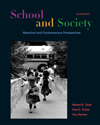 |  School and Society: Historical and Contemporary Perspectives, 4/e Stephen E. Tozer,
The University of Illinois, Chicago
Paul C. Violas
Guy Senese,
Northern Arizona University
Contemporary School Reform: The Post Cold War Era
Internet ExercisesTeachers' voices, as noted in Chapter 14, are often overlooked or missing from the school reform discourse. While teachers unions remain powerful, individual teachers frequently feel as though reform remains "top down" and has limited relevance or applicability to their own classrooms except in abstract ways. Each new federal administration and every state board of education has ideas about what should be happening in schools. Below are three websites that discuss teachers and their role (or lack thereof) in educational decision making. After you read these, reflect on what you think teachers' roles should be, both onsite and in the larger political realm, as far as educational agendas. Think about the benefits and disadvantages of greater participation in governance. If you're interested, you can then check out the site with State Boards of Education (or look for your state under the Resources section of the Online Learning Center) and see what you can find out about getting involved. |
|



 2002 McGraw-Hill Higher Education
2002 McGraw-Hill Higher Education